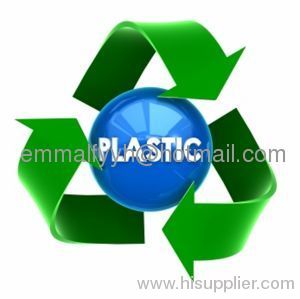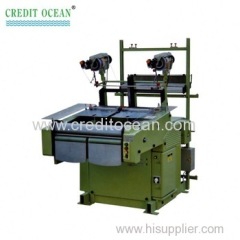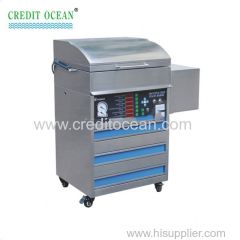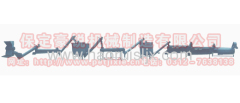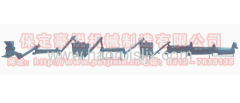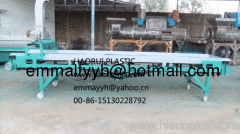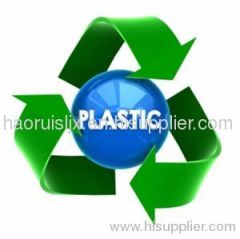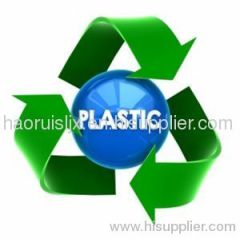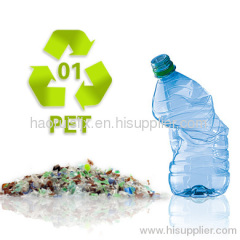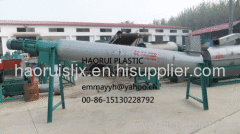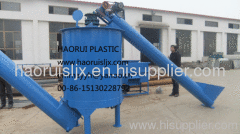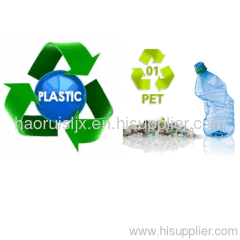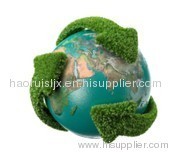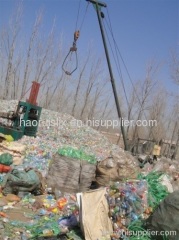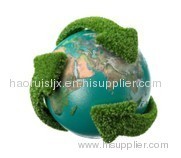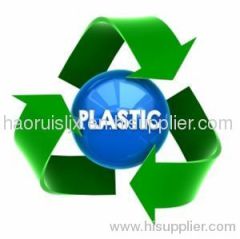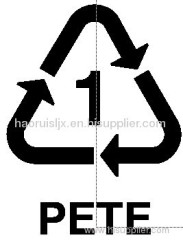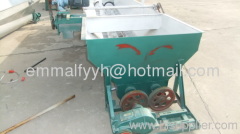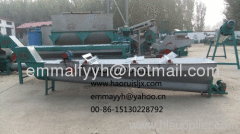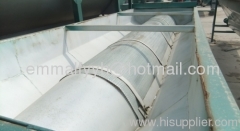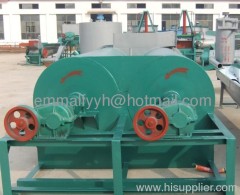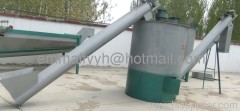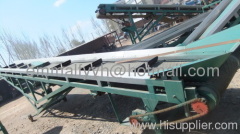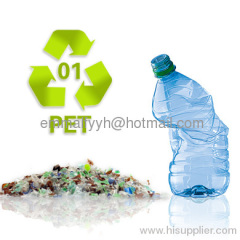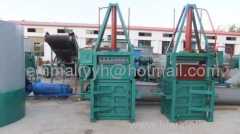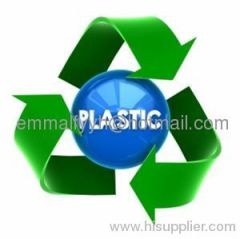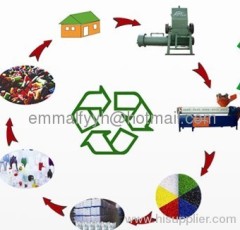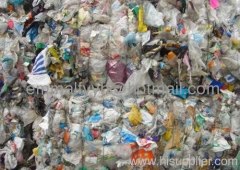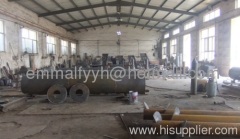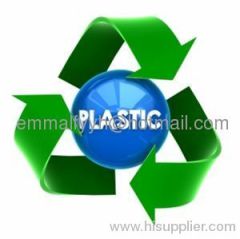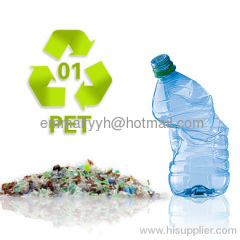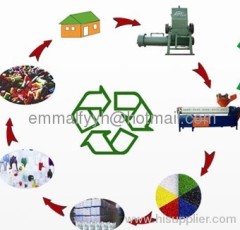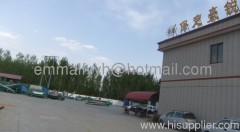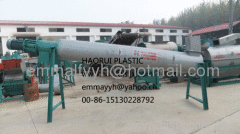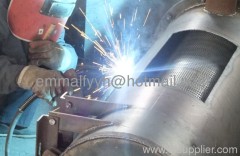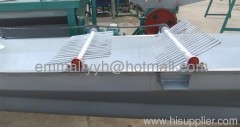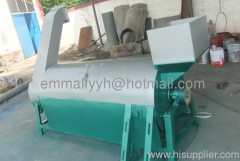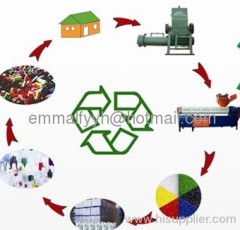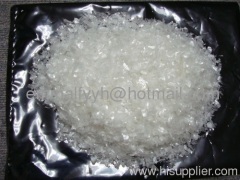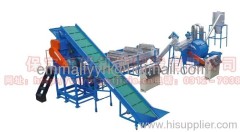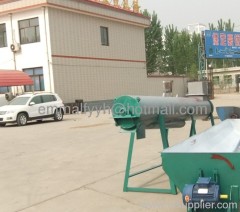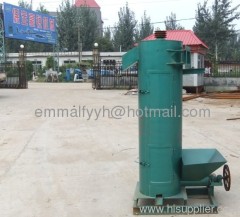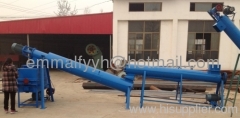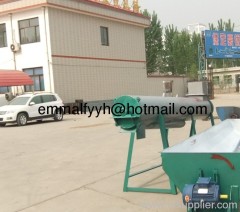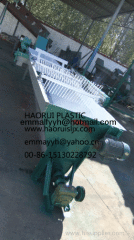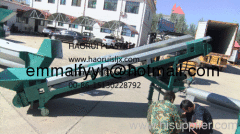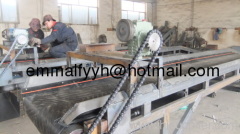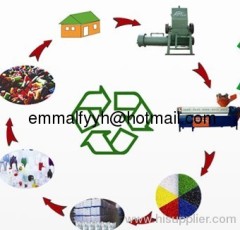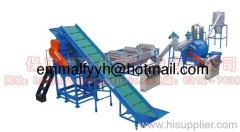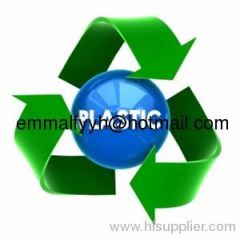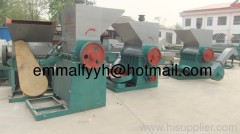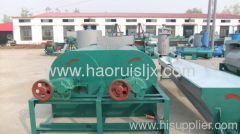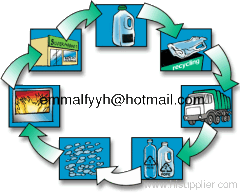
|
Baoding Haorui Machinery Manufacturing Co., Ltd.
|
Recycled PET plastic treatment process
| Payment Terms: | T/T,WU, |
| Place of Origin: | Hebei, China (Mainland) |
|
|
|
| Add to My Favorites | |
| HiSupplier Escrow |
Product Detail
working line machine for fibre plants,can make waste bottle to flakes. washing and drying the materials for fibre plants use
Treatment: Teijin developed a cycle from waste PET bottles DMT (dimethyl terephthalate) and EG (ethylene glycol) method, first crushing and washing waste PET bottles, and then dissolved in EGboiling temperature and the pressure of 0.1MPa EG, PET depolymerization generates a pair of terephthalic acid, hydroxyethyl acrylate (BHET). Then filtered, the residue was removed and additives BHET react with methanol in the methanol boiling temperature and the pressure of 0.1MPa, after the transesterification of DMT and EG.
Then after distillation, separation of DMT and EG, and DMT was purified by recrystallization process; the EG was purified by distillation, methanol can be reused. The recovered DMT and EG purity of 99.99%, comparable to the cost of the production costs and general method of DMT and EG. DMT can be converted into pure TPA (terephthalic acid), used in the manufacture of bottle-grade PET resin. Cycle apparatus can generate about 10% of the raw materials used in the production of resin.
According to the Freedonia Group recently released a report that, by 2014, global demand for caps and sealing products is expected to grow at an annual rate of 4.6% to reach $ 40 billion. As one of the largest types of plastic cover and seal product growth rate will continue to be higher than average.
To promote the continuous development of this market favorable factors such as globalization, urbanization and product mix to a higher value of the changing trend of sealing products, such as child safety cap, tamper-evident cap and dispensing cap.
The United States remains the largest market demand, but demand the fastest growing in Asia, Africa / Middle East, Central and South America and Eastern Europe.
Plastic Recycling Symbol 1
Sometimes it seems like modern America is one colossal plastic palace. The versatile material is in our cars, toys, packaging, clothing, home goods, food utensils, medical devices and so much more. It is also littering our streets, clogging our waterways and choking marine life. Many plastics can be readily recycled, but how do consumers make sense of all the different types and rules?
Number 1 Plastics
PET or PETE (polyethylene terephthalate)
Found in:Soft drink, water and beer bottles; mouthwash bottles; peanut butter containers; salad dressing and vegetable oil containers; ovenable food trays.
Recycling: Picked up through most curbside recycling programs.
Recycled into: Polar fleece, fiber, tote bags, furniture, carpet, paneling, straps, (occasionally) new containers.PET plastic is the most common for single-use bottled beverages, because it is inexpensive, lightweight and easy to recycle. It poses low risk of leaching breakdown products. Recycling rates remain relatively low (around 20%), though the material is in high demand by remanufacturers.
PET or PETE (polyethylene terephthalate)
Found in:Soft drink, water and beer bottles; mouthwash bottles; peanut butter containers; salad dressing and vegetable oil containers; ovenable food trays.
Recycling: Picked up through most curbside recycling programs.
Recycled into: Polar fleece, fiber, tote bags, furniture, carpet, paneling, straps, (occasionally) new containers.PET plastic is the most common for single-use bottled beverages, because it is inexpensive, lightweight and easy to recycle. It poses low risk of leaching breakdown products. Recycling rates remain relatively low (around 20%), though the material is in high demand by remanufacturers.
Plastic Recycling Symbol 2
Number 2 Plastics
HDPE (high density polyethylene)
Found in: Milk jugs, juice bottles; bleach, detergent and household cleaner bottles; shampoo bottles; some trash and shopping bags; motor oil bottles; butter and yogurt tubs; cereal box liners
Recycling: Picked up through most curbside recycling programs, although some allow only those containers with necks.
Recycled into:Laundry detergent bottles, oil bottles, pens, recycling containers, floor tile, drainage pipe, lumber, benches, doghouses, picnic tables, fencing.
HDPE (high density polyethylene)
Found in: Milk jugs, juice bottles; bleach, detergent and household cleaner bottles; shampoo bottles; some trash and shopping bags; motor oil bottles; butter and yogurt tubs; cereal box liners
Recycling: Picked up through most curbside recycling programs, although some allow only those containers with necks.
Recycled into:Laundry detergent bottles, oil bottles, pens, recycling containers, floor tile, drainage pipe, lumber, benches, doghouses, picnic tables, fencing.
HDPE is a versatile plastic with many uses, especially for packaging. It carries low risk of leaching and is readily recyclable into many goods.
Plastic Recycling Symbol 3
Number 3 Plastics
V (Vinyl) or PVC
Found in: Window cleaner and detergent bottles, shampoo bottles, cooking oil bottles, clear food packaging, wire jacketing, medical equipment, siding, windows, piping
Recycling: Rarely recycled; accepted by some plastic lumber makers.
Recycled into: Decks, paneling, mudflaps, roadway gutters, flooring, cables, speed bumps, mats.
V (Vinyl) or PVC
Found in: Window cleaner and detergent bottles, shampoo bottles, cooking oil bottles, clear food packaging, wire jacketing, medical equipment, siding, windows, piping
Recycling: Rarely recycled; accepted by some plastic lumber makers.
Recycled into: Decks, paneling, mudflaps, roadway gutters, flooring, cables, speed bumps, mats.
PVC is tough and weathers well, so it is commonly used for piping, siding and similar applications. PVC contains chlorine, so its manufacture can release highly dangerous dioxins. If you must cook with PVC, don't let the plastic touch food. Also never burn PVC, because it releases toxins.
Plastic Recycling Symbol 4
Number 4 Plastics
LDPE (low density polyethylene)
Found in: Squeezable bottles; bread, frozen food, dry cleaning and shopping bags; tote bags; clothing; furniture; carpet
Recycling: LDPE is not often recycled through curbside programs, but some communities will accept it. Plastic shopping bags can be returned to many stores for recycling.
Recycled into: Trash can liners and cans, compost bins, shipping envelopes, paneling, lumber, landscaping ties, floor tile
LDPE (low density polyethylene)
Found in: Squeezable bottles; bread, frozen food, dry cleaning and shopping bags; tote bags; clothing; furniture; carpet
Recycling: LDPE is not often recycled through curbside programs, but some communities will accept it. Plastic shopping bags can be returned to many stores for recycling.
Recycled into: Trash can liners and cans, compost bins, shipping envelopes, paneling, lumber, landscaping ties, floor tile
LDPE is a flexible plastic with many applications. Historically it has not been accepted through most American curbside recycling programs, but more and more communities are starting to accept it.
Plastic Recycling Symbols 5
Number 5 Plastics
PP (polypropylene)
Found in: Some yogurt containers, syrup bottles, ketchup bottles, caps, straws, medicine bottles
Recycling: Number 5 plastics can be recycled through some curbside programs.
Recycled into: Signal lights, battery cables, brooms, brushes, auto battery cases, ice scrapers, landscape borders, bicycle racks, rakes, bins, pallets, trays
PP (polypropylene)
Found in: Some yogurt containers, syrup bottles, ketchup bottles, caps, straws, medicine bottles
Recycling: Number 5 plastics can be recycled through some curbside programs.
Recycled into: Signal lights, battery cables, brooms, brushes, auto battery cases, ice scrapers, landscape borders, bicycle racks, rakes, bins, pallets, trays
Polypropylene has a high melting point, and so is often chosen for containers that must accept hot liquid. It is gradually becoming more accepted by recyclers.
Plastic Recycling Symbol 6
Number 6 Plastics
PS (polystyrene)
Found in:Disposable plates and cups, meat trays, egg cartons, carry-out containers, aspirin bottles, compact disc cases
Recycling:Number 6 plastics can be recycled through some curbside programs.
Recycled into: Insulation, light switch plates, egg cartons, vents, rulers, foam packing, carry-out containers
PS (polystyrene)
Found in:Disposable plates and cups, meat trays, egg cartons, carry-out containers, aspirin bottles, compact disc cases
Recycling:Number 6 plastics can be recycled through some curbside programs.
Recycled into: Insulation, light switch plates, egg cartons, vents, rulers, foam packing, carry-out containers
Polystyrene can be made into rigid or foam products -- in the latter case it is popularly known as the trademark Styrofoam. Evidence suggests polystyrene can leach potential toxins into foods. The material was long on environmentalists' hit lists for dispersing widely across the landscape, and for being notoriously difficult to recycle. Most places still don't accept it, though it is gradually gaining traction.
Plastic Recycling Symbol 7
Number 7 Plastics
Miscellaneous
Found in: Three- and five-gallon water bottles, 'bullet-proof' materials, sunglasses, DVDs, iPod and computer cases, signs and displays, certain food containers, nylon
Recycling:Number 7 plastics have traditionally not been recycled, though some curbside programs now take them.
Recycled into: Plastic lumber, custom-made products
Miscellaneous
Found in: Three- and five-gallon water bottles, 'bullet-proof' materials, sunglasses, DVDs, iPod and computer cases, signs and displays, certain food containers, nylon
Recycling:Number 7 plastics have traditionally not been recycled, though some curbside programs now take them.
Recycled into: Plastic lumber, custom-made products
A wide variety of plastic resins that don't fit into the previous categories are lumped into number 7. A few are even made from plants (polyactide) and are compostable. Polycarbonate is number 7, and is the hard plastic that has parents worried these days, after studies have shown it can leach potential hormone disruptors.
Then after distillation, separation of DMT and EG, and DMT was purified by recrystallization process; the EG was purified by distillation, methanol can be reused. The recovered DMT and EG purity of 99.99%, comparable to the cost of the production costs and general method of DMT and EG. DMT can be converted into pure TPA (terephthalic acid), used in the manufacture of bottle-grade PET resin. Cycle apparatus can generate about 10% of the raw materials used in the production of resin.
According to the Freedonia Group recently released a report that, by 2014, global demand for caps and sealing products is expected to grow at an annual rate of 4.6% to reach $ 40 billion. As one of the largest types of plastic cover and seal product growth rate will continue to be higher than average.
To promote the continuous development of this market favorable factors such as globalization, urbanization and product mix to a higher value of the changing trend of sealing products, such as child safety cap, tamper-evident cap and dispensing cap.
The United States remains the largest market demand, but demand the fastest growing in Asia, Africa / Middle East, Central and South America and Eastern Europe.
Didn't find what you're looking for?
Post Buying Lead or contact
HiSupplier Customer Service Center
for help!
Related Search
Recycled Pet
Recycled Plastic Granules
Pet Plastic
Plastic Pet Bottle
PET Plastic Bottle
Pet Plastic Box
More>>

